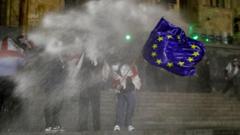The streets of Tbilisi have become a battleground of ideologies, as protesters filled Rustaveli Avenue for the fifth consecutive night, displaying flags representing their aspirations towards the European Union and the George Cross, a symbol of national identity. They are driven by accusations against the ruling party, Georgian Dream, which they claim is opting for Russian affiliations over European ties. Despite the government's denials of any Kremlin connections, their recent actions have led to severe consequences, including a suspension of Georgia's strategic partnership with the United States and a rift with the European Union.
In these critical times, marked by nearly 100 reported injuries among law enforcement and serious allegations of police brutality against detained protesters, the atmosphere is charged. Legal representatives describe unprecedented levels of violence against individuals, alarming many who remember the past struggles under Soviet rule. Critics of the government point out the need for accountability and transparency, while supporters claim the police response has been in defense against violent protests.
The situation is exacerbated by contrasting narratives from both sides. Prime Minister Irakli Kobakhidze and supporters of Georgian Dream characterize the protests as foreign-funded chaos, while opposition figures argue that the government is eroding democracy through compromised elections and authoritarian tactics. As divisions deepen within the political landscape, it remains uncertain whether compromise is achievable.
With the threat of Russian involvement looming overhead, citizens express fears of losing their national identity and sovereignty. Opposition leaders, galvanized by public sentiment, declare a “liberation fight” against what they perceive to be a pro-Kremlin agenda, urging for new elections to restore democratic integrity. The protests have sparked commentary from political analysts, emphasizing the importance of Georgia's navigation of its relationship with both Eastern and Western powers, citing the historical significance of the protests as resonant of Ukraine's Maidans.
As winter approaches and the protests continue to spread beyond Tbilisi to cities like Batumi and Kutaisi, the stakes grow higher. Public servants and diplomats express discontent with the status quo, catalyzing calls for structural change within the political system. Negotiations seem far off, leading citizens to question the government’s long-term commitment to European integration amidst claims of Russian influence.
With regional dynamics shifting, observers await the outcome of this pivotal moment for Georgia, hoping for a peaceful resolution that favors democratic principles and reinforces ties with the West while countering authoritarian tendencies. Georgia's future hangs delicately in the balance, reflective of its aspirations and the realities of its political environment.
In these critical times, marked by nearly 100 reported injuries among law enforcement and serious allegations of police brutality against detained protesters, the atmosphere is charged. Legal representatives describe unprecedented levels of violence against individuals, alarming many who remember the past struggles under Soviet rule. Critics of the government point out the need for accountability and transparency, while supporters claim the police response has been in defense against violent protests.
The situation is exacerbated by contrasting narratives from both sides. Prime Minister Irakli Kobakhidze and supporters of Georgian Dream characterize the protests as foreign-funded chaos, while opposition figures argue that the government is eroding democracy through compromised elections and authoritarian tactics. As divisions deepen within the political landscape, it remains uncertain whether compromise is achievable.
With the threat of Russian involvement looming overhead, citizens express fears of losing their national identity and sovereignty. Opposition leaders, galvanized by public sentiment, declare a “liberation fight” against what they perceive to be a pro-Kremlin agenda, urging for new elections to restore democratic integrity. The protests have sparked commentary from political analysts, emphasizing the importance of Georgia's navigation of its relationship with both Eastern and Western powers, citing the historical significance of the protests as resonant of Ukraine's Maidans.
As winter approaches and the protests continue to spread beyond Tbilisi to cities like Batumi and Kutaisi, the stakes grow higher. Public servants and diplomats express discontent with the status quo, catalyzing calls for structural change within the political system. Negotiations seem far off, leading citizens to question the government’s long-term commitment to European integration amidst claims of Russian influence.
With regional dynamics shifting, observers await the outcome of this pivotal moment for Georgia, hoping for a peaceful resolution that favors democratic principles and reinforces ties with the West while countering authoritarian tendencies. Georgia's future hangs delicately in the balance, reflective of its aspirations and the realities of its political environment.

















